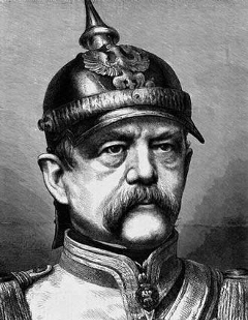Otto von Bismarck
Title: Chancellor, Duke of Lauenburg, and Prince of Bismarck
Birth Name: Otto Eduard Leopold Fürst von Bismarck
Nickname: Iron Chancellor
Birthdate: April 1, 1815
Birthplace: Schönhausen, Kreis Jerichow II, Province of Saxony, Altmark, Prussia (Present-day Saxony-Anhalt, Germany)
Date of Death: July 30, 1898
Occupation: Head of State and Lawyer
Profile: Chancellor of the German Empire (1871–1890).
Website: http://en.wikipedia.org/wiki/Otto_von_Bismarck
Number of Quotes: 38
A government must not waver once it has chosen its course. It must not look to the left or right but go forward.
A great war leaves the country with three armies: an army of cripples, an army of mourners, and an army of thieves.
On the long-term, corrosive consequences of major warfare.
A journalist is a person who has mistaken their calling.
A statesman... must wait until he hears the steps of God sounding
through events, then leap up and grasp the hem of His garment.
All treaties between great states cease to be binding when they come in conflict with the struggle for existence.
An appeal to fear never finds an echo in German hearts.
Anyone who has ever looked into the glazed eyes of a soldier dying on the battlefield will think hard before starting a war.
Be polite; write diplomatically; even in a declaration of war one observes the rules of politeness.
Fools learn from experience; I prefer to learn from the experience of others.
Also rendered as: Only a fool learns from his own mistakes. The wise man learns from the mistakes of others.
God has a special providence for fools, drunkards, and the United States of America.
History is simply a piece of paper covered with print: the main thing is to make history, not to write it.
I am of the opinion that the idea of the Polish nation is stronger than its material resources.
Reflecting on the persistent national identity of Poland despite its partition and lack of statehood.
I do not regard the procuring of peace as a matter in which we should play the role of arbiter between
different opinions ... more that of an honest broker who really wants to press the business forward.
I have seen three emperors in their nakedness, and the sight was not inspiring.
Laws are like sausages. It's better not to see them being made.
Often cited to describe the messy, uncompromising nature of political negotiation and legislation. The
authenticity of this precise phrasing is debated, but it perfectly captures his cynical view of politics.
Never believe anything in politics until it has been officially denied.
A classic expression of political cynicism and the hidden nature of diplomatic maneuverings.
No civilization other than that which is Christian, is worth seeking or possessing.
Not through speeches and majority decisions will the great questions of the day
be decided—that was the great mistake of 1848 and 1849—but by iron and blood.
His most famous quote, from an 1862 speech, outlining his pragmatic and forceful method for unifying Germany.
People never lie so much as after a hunt, during a war, or before an election.
A cynical observation on human nature in high-pressure situations.
Politics is not an exact science.
Politics is the art of the next best.
Politics is the art of the possible.
Also phrased as: the attainable — the art of the next best.
Politics ruins the character.
The great questions of the day will not be settled by means of speeches and majority decisions but by iron and blood.
The main thing is to make history, not to write it.
Emphasizing action over theory and the primacy of statecraft over historiography.
The political situation is not bad if you have three solutions for it. If you have only one or two, it's dangerous. If you have none at all, you are lost.
Demonstrating his pragmatic approach to statecraft, always valuing flexibility and multiple options.
The secret of politics? Make a good treaty with Russia.
The special providence for fools, drunkards, and the United States of America.
Often misquoted as: God has a special providence for fools, drunkards, and
the United States.
His actual sentiment was that the US was uniquely protected by geographic isolation and the balance of power in Europe.
The statesman's task is to hear God's
footsteps marching through history, and to try to catch on to His coattails
as He marches by.
On the difficulty of leadership, which involves sensing and riding the wave of larger historical forces rather than creating them from nothing.
There is a Providence that protects idiots, drunkards, children and the United States of America.
There is no such thing as absolute truth; there are only facts and interpretations.
A philosophical statement reflecting his realist worldview.
To retain respect for sausages and laws, one must not watch them in the making.
When a man says he approves of something in principle, it means he hasn't the slightest intention of carrying it out in practice.
When you say that you agree to a thing in principle, you mean that you have not the slightest intention of carrying it out in practice.
A cynical but often accurate view of diplomatic language and political promises.
When you want to fool the world, tell the truth.
Whoever speaks of Europe is wrong: it is a geographical expression.
With a gentleman I am always a gentleman and a half, and with a fraud I try to be a fraud and a half.
Summarizing his flexible and often ruthless diplomatic strategy, adapting his methods to his opponent.
You can do anything with bayonets except sit on them.
Meaning that military force is excellent for conquest but useless for long-term, stable governance.

